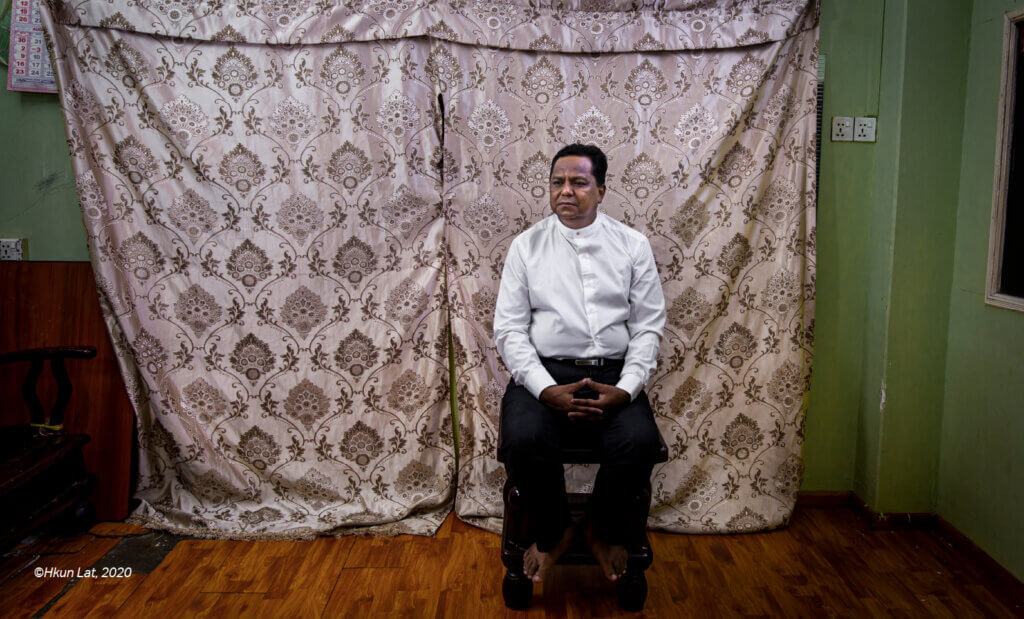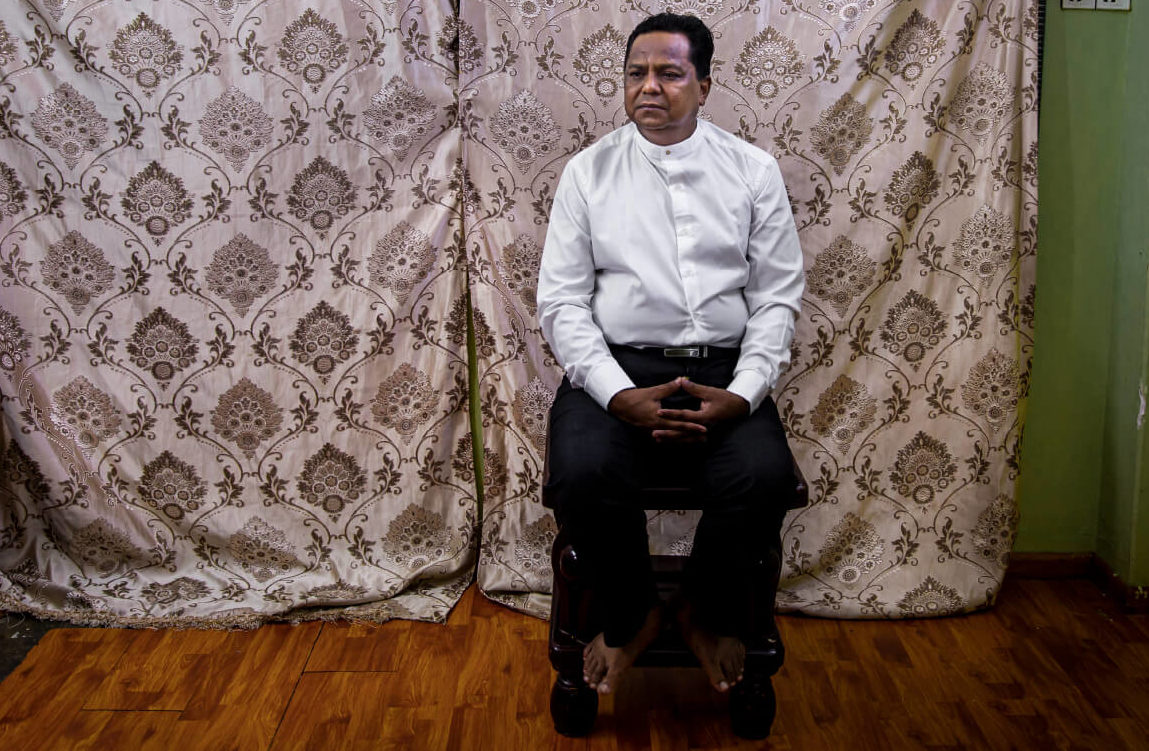Sippachai Kunnuwong for Fortify Rights
On January 20, 2023, Fortify Rights and 16 individual complainants from Myanmar filed a criminal complaint in Germany under universal jurisdiction against senior Myanmar military officials and others for genocide, war crimes, and crimes against humanity. This article is part of a four-part series profiling some of the complainants.
On August 8, 2021, more than six months after the military coup d’état in Myanmar, Rohingya human rights defender and businessperson Abdul Rasheed joined thousands of protesters in a march to the White House in Washington, D.C., demanding the U.S. government stop the junta’s deadly crackdown on civilians.
By that time, the number of people jailed in Myanmar for protesting the coup reached thousands and the Myanmar junta had killed several hundred people nationwide. Abdul Rasheed arrived in the U.S. a few months earlier after fleeing from the Myanmar junta.
“It’s time to bring back justice to the people of Myanmar,” said Abdul Rasheed, as he addressed the crowds at the protest. Urging his compatriots from Myanmar’s other ethnic groups to also help end the genocide against the Rohingya, he proclaimed: “We work together! We fight together! We win together!”
Back home in Myanmar, 61-year-old Abdul Rasheed was a Rohingya Muslim politician and successful entrepreneur.
He attempted to run for national elections in Myanmar twice—in 2015 and 2020. However, like other Rohingya candidates, the election commission rejected his candidacy on ethnic and religious grounds, questioning his parents’ citizenship. Up until that point, the Government of Myanmar and the military were united in denying the existence of the Rohingya people.
“[The authorities] didn’t have any reason [to disqualify me],” Abdul Rasheed said. “It was based on a discriminatory policy against Muslims. They used the executive powers beyond the law and constitution. What they did was illegal.”
“The military revoked our citizenship.”
For decades, the Myanmar authorities have used citizenship laws and identity cards as tools of genocide against Rohingya. In 1982, Myanmar’s military government led by General Ne Win passed a new citizenship law, which effectively denied Rohingya and other ethnic minorities in Myanmar from having equal access to full citizenship rights.
“We, Rohingya, are an indigenous minority of Myanmar,” Abdul Rasheed said. “We were born there. Our ancestors were born there. But the military revoked our citizenship, making us stateless . . . The military revoked our citizenship and our voting rights.”
Growing up in Rakhine State, Abdul Rasheed and his family moved to Yangon, Myanmar’s largest city, in 1983 when his father accepted a new job in the civil service. After finishing high school, Abdul Rasheed established a successful textile company and gold import business.
But when targeted and state-sponsored attacks broke out against Rohingya and other Muslims in 2012, displacing more than 140,000 Rohingya in Rakhine State, the injustice compelled Abdul Rasheed to act.
“That’s why I started in human rights work and politics.” Abdul Rasheed told Fortify Rights. “I wanted to speak out in the parliament against discriminatory policies against Muslims.”
Recalling the attacks in 2012, Abdul Rasheed said:
[The violence] started in the Narzi quarter where I was born. My relatives, friends, and neighbors’ houses were all burned down . . . [The authorities] started killing people. After that, they moved people from downtown to rural areas. People couldn’t go for jobs and to schools. They couldn’t go to the banks. They couldn’t associate with any business.

“Raising the voice of the Rohingya”
After the 2012 violence, Abdul Rasheed began working to seek justice for the Rohingya community. He explained: “I supported international organizations with documentation . . . [and conducting] interviews and translations . . . and [provided] documents and evidence on all the atrocities [committed] against my people”
On one of his trips to the U.S. with Fortify Rights in 2017 to raise attention to the situation of the Rohingya, Abdul Rasheed met several prominent actors, including members of then-U.S. Vice President Mike Pence’s team at the White House, senior officials in Congress and at the United Nations, and others.
As his advocacy increased, so did the attention on him from the Myanmar authorities:
[The authorities] came to my home for a search in 2017. They also tried to arrest me at the airport when I was leaving for the U.S. . . . They always monitored me and appointed a special police officer to monitor me and my activities. They wanted me to notify them when I traveled out of the country . . . This happened all the time.
Following the February 2021 coup, Abdul Rasheed returned to the U.S. in search of safety.
“[The junta forces were] hunting politicians and activists and putting them in prison,” Abdul Rasheed said. “They also killed [them] as well . . . It is not safe for me to return to my country.”
“The dark will not remain”
Now in the U.S., Abdul Rasheed has carried on his efforts to advocate for the rights of the Rohingya people. Describing this advocacy, he said: “Since 2012, I worked with many human rights organizations but always I had fears and [felt] scared. I couldn’t work openly, talk openly, and spread my views openly. Now, I can openly [advocate] for the rights of the people—the Rohingya people and the people of Myanmar.”
In January 2023, Abdul Rasheed joined Fortify Rights and 15 individual complainants from Myanmar in submitting a criminal complaint with the Federal Public Prosecutor General of Germany under the principle of universal jurisdiction, seeking justice for atrocities committed against the people of Myanmar by senior Myanmar military generals and others.
Speaking about the importance of this complaint, Abdul Rasheed said: “Accountability is essential to promote justice and rights in the country. [The] military is enjoying impunity and continuing [its] abuses and barbaric treatment against the people.”.
Continuing, he told Fortify Rights: “I am a witness to all the atrocities happening to my people. The atrocities also happened to me . . . I want justice because it would set an example for [everyone]. When I get my rights, I believe, [everyone] will get the same rights. So, it’s not fighting for myself. It’s fighting for my people.”
Speaking about the future of Myanmar, justice, and accountability, Abdul Rasheed said: “We all need to keep hoping that the dark will not remain. At some time, there will be light.”
Sippachai Kunnuwong is a Communications Associate with Fortify Rights. Follow him on Twitter @10pachai.



